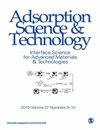氧化锌纳米粒子增强芽孢杆菌对重金属胁迫的耐受性和修复潜力
IF 3.2
4区 工程技术
Q2 CHEMISTRY, APPLIED
引用次数: 4
摘要
纳米粒子和细菌因其去除废水中重金属的能力而受到世界各国的广泛关注。本研究旨在研究耐氧化锌菌株(蜡样芽孢杆菌和大内溶芽孢杆菌)与不同浓度氧化锌纳米颗粒(ZnO NPs)(5、10、15、20和25 mg/L)的相互作用,以及它们如何应对重金属胁迫(Pb、Cd、Cr和Cu)。在较低浓度(5和10 mg/L)氧化锌NPs下,细菌对HMs的生长速度和耐受性提高,而在较高浓度的氧化锌NPs下则不受影响。在较低浓度的ZnO NPs下,最小的抑制区和较高的锌增溶率证实了这些发现。扫描电镜(SEM)显示,高浓度的ZnO NP增加了细菌细胞中HM的积累,对细菌的形态产生了显著的影响,并导致细菌膜上的气孔,而在低浓度的情况下,细胞没有受到影响。氧化锌NPs在重金属胁迫下产生的抗氧化酶(SOD、POD和CAT)、硫代巴比妥酸活性物质(TBARS)和过氧化氢(H2O2)含量较低,也进一步支持了这一结果。本研究表明,低浓度氧化锌NPs协同处理芽孢杆菌可提高芽孢杆菌的耐受性,显著降低HM毒性。本文章由计算机程序翻译,如有差异,请以英文原文为准。
Zinc Oxide Nanoparticles Enhance the Tolerance and Remediation Potential of Bacillus spp. against Heavy Metal Stress
Nanoparticles and bacteria have received a great attention worldwide due to their ability to remove heavy metals (HMs) from wastewater. The current study is aimed at finding the interaction of HMs-resistance strains (Bacillus cereus and Lysinibacillus macroides) with different concentrations (5, 10, 15, 20, and 25 mg/L) of zinc oxide nanoparticles (ZnO NPs) and how they would cope with HM stress (Pb, Cd, Cr, and Cu). The growth rate and tolerance potential of bacteria were increased at lowered concentrations (5 and 10 mg/L) of ZnO NPs against HMs while it was unaffected at higher concentrations of ZnO NPs. These findings were confirmed by minimum inhibition zone and higher zinc solubilization at lower concentrations of ZnO NPs. Scanning electron microscopy (SEM) revealed that higher concentrations of ZnO NP increased HM accumulation in bacteria cells which had a significant impact on bacterial morphology and caused pores in bacterial membrane while in the case of lower concentrations, the cell remained unaffected. These results were further supported by the less production of antioxidant enzymes (SOD, POD, and CAT), thiobarbituric acid reactive substances (TBARS), and hydrogen peroxide (H2O2) contents at lower concentrations of ZnO NPs against heavy metal stress. This study suggested that synergistic treatment of Bacillus spp. with lower concentrations of ZnO NPs enhances the tolerance potential and significantly reduces the HM toxicity.
求助全文
通过发布文献求助,成功后即可免费获取论文全文。
去求助
来源期刊

Adsorption Science & Technology
工程技术-工程:化工
CiteScore
5.00
自引率
10.30%
发文量
181
审稿时长
4.5 months
期刊介绍:
Adsorption Science & Technology is a peer-reviewed, open access journal devoted to studies of adsorption and desorption phenomena, which publishes original research papers and critical review articles, with occasional special issues relating to particular topics and symposia.
 求助内容:
求助内容: 应助结果提醒方式:
应助结果提醒方式:


